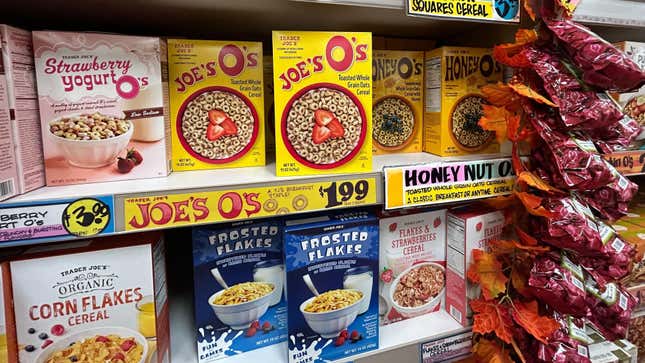
Terms like “off-brand” or “generic” used to be code for “cheap” or “not as good” as the leading brands’ products, but times have changed. The New York Times reports that name brands like Doritos and Hershey are no longer the undisputed kings of the snack aisle in many grocery stores as private labels are gaining popularity among budget-conscious consumers.
Private-label foods and beverages have gradually grown to take a 20.6% share of grocery dollars, up from 18.7% pre-pandemic, according to data from market research firm Circana, as reported by NYT. Chips in particular have become a growing and even more competitive market when it comes to taking a share of consumers’ wallets. Now, more commonly dubbed “private label” brands are flying off shelves because they’re affordable, taste great, and at times offer flavor selections that big name brands don’t.
Take, for example, the potato chips offered by Casey’s General Store, a Midwest chain of convenience stores (and pizza). Casey’s released limited-edition chips this past summer with flavors such as sweet corn, barbecue brisket, and jalapeño cheddar. The chips drew customers to the point that Casey’s private brand accounted for a quarter of the chain’s chip sales, in direct competition with more well-known brands such as Frito-Lay, owned by PepsiCo.
Casey’s now has 350 private-label products in its stores and plans to add 45 this year, the NYT reports.
In addition to chips, categories such as cheese, canned vegetables, and coffee have also seen increases in private label sales that might make national brands a bit nervous. Research firm Numerator reports private labels accounted for 45% of cheese sales, 38% of canned vegetable sales, and nearly 15% of coffee sales in April through June 2023.
Considering inflation reached 3.7% in September (lower than that time last year, but still not the best), SNAP benefits have returned to their (lower) pre-pandemic levels, and student loan payments and interest have restarted following a more than three-year pause, it makes sense consumers would look to more affordable store labels as a swap for expensive name brands.
However, Social media and TikTok in particular are also contributing factors to the rise in private label food brand success. Everyone knows Hershey’s chocolate, but being the person to “discover” the best organic chocolate at Trader Joe’s like this TikTok user is going to gain many more views and engagements online.
Chain stores like Casey’s have openly stated their goal is not to eat into the sales of the name-brand products they carry on their shelves, but rather to offer consumers a wider variety of options. To the benefit of shoppers, though, they appear to be achieving both.